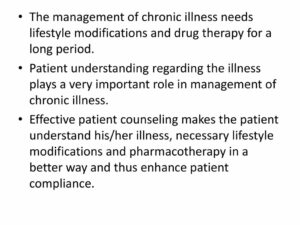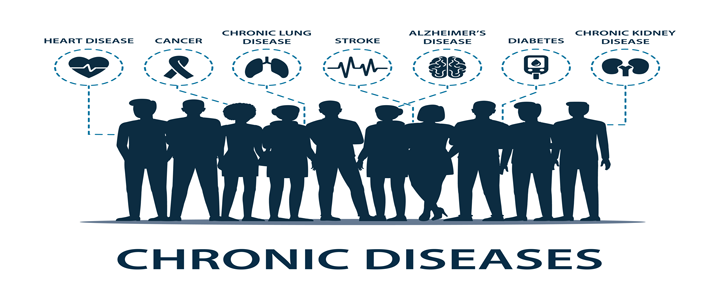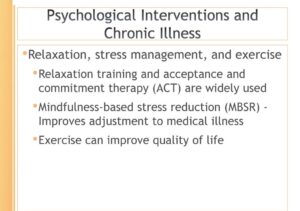Therapy for chronic illness is a process that helps people manage their conditions more effectively. It can be very beneficial for those who are struggling to cope with the everyday challenges of living with a chronic illness.
In this article, we will explore the concept of therapy for chronic illness, and look at some of the ways it can help improve the quality of life for those affected by chronic illness. We will also hear from experts in the field, and learn about one person’s experience with therapy for chronic illness.
Contents
Understanding Therapy For Chronic Illness

Chronic illness is defined as a health condition that lasts for three months or more. It can be caused by several factors, including genetics, lifestyle choices, and environmental factors. Chronic illness can have a significant impact on a person’s quality of life and can lead to feelings of isolation, anxiety, and depression.
Conditions Considered As Chronic Illnesses
Several conditions can be considered chronic illnesses. Some of the most common include:
- Arthritis
- Asthma
- Cancer
- Diabetes
- Heart disease
Theory Behind Therapy For Chronic Illness
The theory behind therapy for chronic illness is that by managing the condition more effectively, people can improve their quality of life. The goal of therapy for chronic illness is to help people learn how to cope with their condition and find ways to manage it that work best for them.
History And Development
The history and development of therapy for chronic illness are still relatively new. It first started to be developed in the 1970s, when doctors and researchers began to look at ways to help people manage chronic illness more effectively. Since then, therapy for chronic illness has been constantly evolving.
Unfolding Therapy For Chronic Illness

Who Can It Help
Therapy for chronic illness can be beneficial for anyone who is struggling to cope with their condition. It can help people learn how to manage their symptoms and find ways to improve their quality of life.
How Does It Work

Therapy for chronic illness typically involves several different techniques. These can include:
- Cognitive-behavioral therapy
- Relaxation techniques
- Stress management
- Exercise
- Nutrition counseling
- Sleep hygiene education
Techniques Used In Chronic Illness
The techniques used in therapy for chronic illness vary depending on the individual and the condition being treated. However, some of the most common techniques include:
- Cognitive-behavioral therapy: This type of therapy helps people identify and change negative thinking patterns. It can be used to help people manage their symptoms and improve their quality of life.
- Relaxation techniques: Relaxation techniques, such as yoga and meditation, can help people reduce stress and anxiety.
- Stress management: Stress management techniques, such as relaxation and exercise, can help people manage their symptoms and improve their quality of life.
- Sleep hygiene education: Sleep hygiene education can help people learn about healthy sleep habits and make necessary changes to their routine.
- Nutrition counseling: Nutrition counseling can help people learn about healthy eating habits and make necessary changes to their diet.
- Exercise: Exercise can help people manage their symptoms and improve their quality of life.
Evaluating Therapy For Chronic Illness

There is no one-size-fits-all answer when it comes to evaluating the effectiveness of therapy for chronic illness. However, several factors can be considered when determining if this type of treatment is right for you or a loved one.
Benefits of Therapy For Chronic Illness
There are several benefits of this therapy. These can include:
- improved quality of life
- reduced stress and anxiety
- increased sense of control
- improved coping skills
- enhanced self-care abilities
- provide a sense of support and community
Limitations of Chronic Illness
While this therapy can be beneficial, it is important to keep in mind that it is not a cure-all. There are several limitations to chronic illness, including:
- the condition may not improve
- the cost of therapy for chronic illness can be expensive
- it may be difficult to find a therapist who specializes in chronic illness
- the effects of this type of treatment may not be immediately noticeable
- therapy requires a significant time commitment from both the patient and therapist, which may not be feasible for everyone.
Why Consider It
If you are struggling to cope with your condition, therapy for a chronic illness may be a good option for you. It can help you learn how to manage your symptoms and improve your quality of life.
NOTE: If you are considering therapy for chronic illness, it is important to weigh the pros and cons carefully and talk to your doctor about any concerns you have.
Finding a Therapist
If you are interested in trying this therapy, the first step is to find a therapist who specializes in this type of treatment. It is important to interview several therapists before choosing one that is right for you.
How To Find One
There are a few ways to find a therapist who specializes in chronic illness.
- First, you can ask your doctor for referrals.
- You can also search online or through organizations such as the American Psychological Association.
What To Look Out For
When you are looking for a therapist, it is important to keep in mind that not all therapists are created equal. There are a few things you should look out for when choosing a therapist, including; the therapist should-
- Have experience treating chronic illness.
- Be licensed and accredited.
- Have positive reviews from past clients.
- Be able to tailor treatment to your needs.
Red Flags To Avoid
When looking for a therapist, it is important to be aware of red flags. Some things to look out for include therapy that:
- focuses on miracle cures
- blames you for your condition
- is not tailored to your specific needs
NOTE: It is also important to find a therapist who has experience treating chronic illness. And who understands the unique challenges that come with this type of diagnosis.
Pursuing Training In Therapy For Chronic Illness
If you are interested in becoming a therapist who specializes in chronic illness, there are a few things you need to do.
- First, you will need to get a degree in psychology or a related field.
- Second, you will need to pursue specialized training in this area.
- Third, you will need to obtain licensure and certification.
You can find more information about becoming a therapist on the American Psychological Association website.
Hearing From Experts
If you are still unsure whether this therapy is right for you, it may help to hear from experts in the field. Here is what some of them have to say:
“Chronic illness can take a toll on your mental health. If you’re struggling to cope, therapy can help.” – Psychologist Mary Alvord, Ph.D
“Therapy can provide support, guidance, and practical tools for managing chronic illness.” – Psychologist Barbara Greenberg, Ph.D
Case Study
To get a first-hand account of how therapy for chronic illness has helped someone, we interviewed Maria, a 34-year-old woman who has been living with chronic fatigue syndrome for the past 12 years.
Maria: When I was first diagnosed, I didn’t know how to cope. I felt like I was never going to get better. Therapy has helped me learn how to manage my symptoms and live a fuller life despite my illness.
Resources
There are several resources available on this therapy. These include:
- Books such as Coping with Chronic Illness by Debbie Mandel and The Mindful Way through Depression by Mark Williams, John Teasdale, Zindel Segal, and Jon Kabat-Zinn
- Websites such as the National Center for Complementary and Integrative Health
- Articles such as “The Role of Therapy in Coping with Chronic Illness” by Diane K. Kovacs
Conclusion

If you are struggling to cope with your chronic illness, therapy may be a good option for you. It can help you learn how to manage your symptoms and improve your quality of life. While it is important to keep in mind that therapy is not a cure-all, it can be a helpful tool in managing your condition. When looking for a therapist, it is important to be aware of red flags and to get referrals from experts in the field. There are several resources available on this topic, including books, websites, and articles.
A Word From Therapy Mantra
Your mental health — Your psychological, emotional, and social well-being — has an impact on every aspect of your life. Positive mental health essentially allows you to effectively deal with life’s everyday challenges.
At TherapyMantra, we have a team of therapists who provide affordable online therapy to assist you with issues such as depression, anxiety, stress, workplace Issues, addiction, relationship, OCD, LGBTQ, and PTSD. You can book a free therapy or download our free Android or iOS app.


